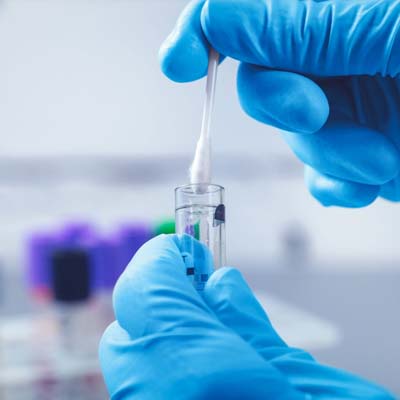New Hope for Early Stage Pancreatic Cancer

August 30, 2022
The incidence of pancreatic cancer has risen significantly since 2000, especially in women younger than 55. According to the American Cancer Society, an estimated 62,210 Americans will receive a pancreatic cancer diagnosis this year alone, and nearly 50,000 people will die of the disease.
Pancreatic cancer usually doesn’t cause symptoms until the disease is advanced, delaying diagnosis and resulting in a poor prognosis for the majority of patients whose tumors have grown large or spread to other organs. While it accounts for only 3 percent of all cancers in the U.S., it causes 7 percent of cancer deaths, making it one of the most lethal malignancies.
Rosario Ligresti, M.D., chief of Gastroenterology at Hackensack University Medical Center, explains: “Pancreatic cancer is predicted to become the second-leading cause of cancer death in the world by 2030, overtaking colon cancer. We absolutely need a better way to screen for it.”
Early Warning
In response, Hackensack has launched an innovative surveillance program that screens individuals who are at high risk for developing familial or hereditary pancreatic cancer. Inherited genetic syndromes account for about 10 percent of cases.
This new initiative is the first of its kind in New Jersey. Patients who are eligible will receive both an imaging test and a recently approved biomarker test that measures the immune system’s response to diseases in the blood.
Biomarker testing is a way to look for genes, proteins and other substances that can provide information about cancer. Each person's cancer has a unique pattern of biomarkers. Some biomarkers affect how certain cancer treatments work.
“Biomarker testing isn’t for everyone, but for someone with a strong family history of pancreatic cancer, it can be a lifesaver,” says Dr. Ligresti. “Even though this kind of testing is new, it’s already been proven to find asymptomatic, early cancers in members of high-risk families.”
Know the Signs
“Pancreatic cancer is often called the silent killer, and with good reason: Most patients don't experience symptoms until the cancer is big enough to impact the surrounding organs,” says Gregory Tiesi, M.D., FACS, FSSO, medical director of Hepatobiliary Surgery at Jersey Shore University Medical Center “Even then, the symptoms are often vague, which is why this testing is so important.”
If you experience these symptoms, talk to your doctor:
- Yellowing of the skin and eyes (called jaundice)
- Belly or back pain
- Weight loss and poor appetite
- Unexplained nausea and vomiting
Early pancreatic cancer can also lead to conditions such as gallbladder or liver enlargement, blood clots or the new onset of diabetes. If other tests and symptoms lead to these diagnoses, and you are at elevated risk for pancreatic cancer, your doctor may want to consider pancreatic cancer as a possible cause.
“If pancreatic cancer is diagnosed while it is still localized, treatment is much more likely to be successful than if it has spread,” says Dr. Tiesi. “Localized pancreatic cancer has a five-year survival rate of 42 percent, versus only 3 percent for cancer that has spread beyond the lymph nodes to other organs.”
Find Out if You Qualify
If you have a family history of pancreatic cancer, speak with your doctor to see if you meet the criteria to be considered for the screening.
Risk Factors for Pancreatic Cancer
The average lifetime risk of non-hereditary pancreatic cancer is about 1 in 64, according to the American Cancer Society. It rises—sometimes significantly—for people with certain risk factors, including:
- Smoking
- Drinking
- Obesity (BMI 30 or more)
- Type 2 diabetes
- Chronic pancreatitis
- Regular exposure to dry cleaning and metalworking chemicals
- Older age
- Male gender
- African American race
Next Steps & Resources:
- Meet our source: Rosario Ligresti, M.D.
- To make an appointment with Dr. Ligresti or an oncologist near you, call 800-822-8905 or visit our website.
- For more information about early pancreatic cancer screening, call 551-795-1675
The material provided through HealthU is intended to be used as general information only and should not replace the advice of your physician. Always consult your physician for individual care.
What’s your risk for cancer?

Is Genetic Testing for Breast Cancer Right for Me?
One of the most effective ways to treat breast cancer is early detection.

Pediatric Genetic Testing Can Help Save Lives
Children require genetic testing for a variety of reasons, including both universal newborn screening and as indicated for certain medical concerns.
Find a doctor near me

Cancer Clues Are In Your Genes
It would be difficult to find a family that hasn’t been affected by some type of cancer. But when should a family be concerned about a genetic link to cancer?

What Genetics Can Tell You About Your Cancer Risk
Each of our body's cells contains approximately 25,000 genes in which are encoded the biological instructions for building and operating the human body. Therein lies the key to understanding cancer.

Surgery to Reduce Breast Cancer Risk
One in 8 American women will develop invasive breast cancer over the course of her lifetime. Certain factors can make someone at higher risk of developing breast cancer.

How Does Prostate Cancer Start?
About one man in eight will be diagnosed with prostate cancer at some point during his life. It’s the most common cancer among men after skin cancer and the second-leading cause of cancer-related death in men after lung cancer.
